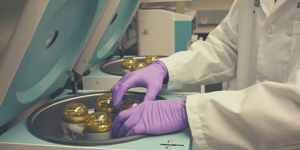Understanding Pancreatic Cancer: Latest Research and Treatment Advances
January 14, 2025 Posted by AHW Endowment

Pancreatic cancer is one of the most challenging cancers to treat, with only a 12% five-year survival rate due to late detection and limited treatment options. In Wisconsin and across the U.S., pancreatic cancer is a growing public health concern that disproportionately affects certain communities, significantly impacting both urban and rural areas where access to specialized care varies. This has led to increased focus on developing more accessible screening methods and treatment options for all Wisconsin residents, regardless of location or socioeconomic status.
In a recent episode of the Advancing a Healthier Wisconsin Endowment’s (AHW’s) monthly livestream, Coffee Conversations with Scientists, Gustavo W. Leone, Ph.D., director of the Medical College of Wisconsin (MCW) Cancer Center and senior associate dean of cancer research at MCW, discussed the latest research and treatment advances in fighting this aggressive disease.
What Is Pancreatic Cancer?
There are two distinct types of pancreatic cancer, each originating from different cells in the pancreas. As Dr. Leone explained, the first type, endocrine or pancreatic neuroendocrine cancer, develops from hormone-producing cells. The second and more common type is exocrine (ductal) or pancreatic adenocarcinoma, which originates from cells that produce digestive enzymes. This distinction is important as it shapes treatment approaches and outcomes for pancreatic cancer patients.
The challenges in treating pancreatic cancer are due to its unique characteristics. Unlike breast or colorectal cancer, where early screening methods are well-established, pancreatic cancer often goes undetected until symptoms appear in its advanced stages. As Dr. Leone explained, the disease creates a tough shield of collagen and fibroblast cells around its tumors, making drug delivery to the tumor difficult and weakening the effectiveness of traditional treatments.
Who Is at Risk of Developing Pancreatic Cancer?
Understanding the risk factors for pancreatic cancer plays a critical role in prevention and early detection. Smoking is one of the most significant risk factors, doubling the chance of developing this disease. Another important risk factor is a history of pancreatitis, a condition characterized by inflammation of the pancreas.
While most pancreatic cancer cases occur spontaneously, genetic factors play a role in some patients. Inherited gene mutations, such as BRCA1 (Breast Cancer Gene 1), can significantly increase risk. Age is also a factor. According to Dr. Leone, regular medical checkups are crucial for individuals with these known risk factors, and maintaining a healthy lifestyle is essential for risk management.
Innovations in Pancreatic Cancer Treatment
Dr. Leone and MCW researchers are developing innovative strategies to enhance the immune system's ability to identify and attack tumor cells. Radiation therapy is being used not just to destroy cancer cells but also to make tumors more recognizable to immune cells. These advances are being tested through various clinical trials at MCW, focusing on both localized and metastatic disease. New targeted therapies designed specifically for RAS (Rat sarcoma) mutations, present in 95% of pancreatic cancers, are especially promising.
“What’s really interesting—in my opinion—is that out of these 10-to-12 trials we have at MCW, half of them are from ideas and researchers right here at MCW, where they’ve taken the idea, done the research, developed their ideas in preclinical models, and then moved them to clinical trials,” said Dr. Leone.“ Those investigator-initiated trials are only delivered here, and that’s very important for the community and patients. They can get the best treatment.”
Watch Dr. Leone discuss how AHW funding drives innovative cancer research and clinical trials that could transform treatment for Wisconsin patients:
The future of pancreatic cancer treatment depends largely on improving early detection methods. Researchers are making significant strides in developing blood-based testing that can detect shed cancer cells and debris. While the current CA (Carbohydrate antigen) 19-9 marker exists, it only detects late-stage disease, prompting research into more effective early-stage biomarkers. For high-risk patients with genetic predisposition, advanced imaging techniques are being refined to catch the disease in its earliest stages.
Dr. Leone emphasized the importance of seeking care at academic medical centers with specialized expertise in pancreatic cancer. He strongly advocates getting second opinions and noted that this practice is not only accepted but encouraged among healthcare professionals. Clinical trials should be considered a credible treatment option, as they often provide access to the latest therapeutic advances while ensuring patients receive at least the current standard of care.
Read about AHW-supported research addressing pancreatic cancer at MCW:
Healthcare Disparities in Pancreatic Cancer Care
In Wisconsin, access to specialized pancreatic cancer care varies significantly across urban and rural communities. Dr. Leone highlights that while world-class treatment options and clinical trials are available at academic medical centers like MCW, many Wisconsin residents face substantial barriers to accessing this care.
Rural communities may struggle with traveling the distance to specialized centers, while urban residents might encounter challenges such as transportation, work schedules, and health care costs. Dr. Leone explained that these disparities impact African American individuals in particular, who face nearly twice the mortality rate from pancreatic cancer compared to White populations.
Addressing these disparities in Wisconsin involves understanding both biological factors and social determinants of health. Clinical trial participation, which often requires frequent visits to medical centers, can be especially challenging for patients who need to take time off work, arrange childcare, or navigate complex transportation systems across the state.
MCW researchers are working to understand these challenges, recognizing that improving outcomes requires addressing not only the biological aspects of pancreatic cancer but also the organizational and social structures that create barriers to care for Wisconsin residents.
Learn More About Pancreatic Cancer
To hear more from Dr. Leone and the science behind pancreatic cancer, tune into the Coffee Conversations with Scientists episode here:



